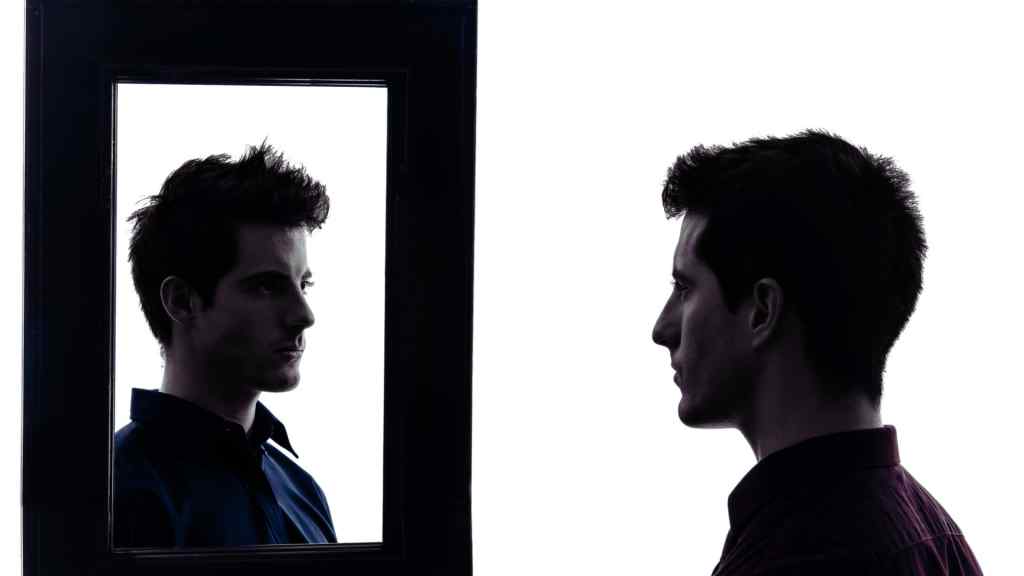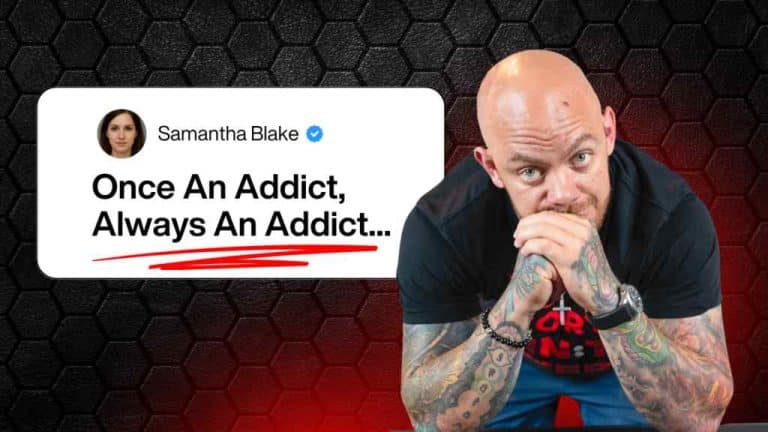“Once an addict, always an addict.”
If you’ve ever struggled with drug addiction, you’ve probably heard that phrase more times than you can count. It’s repeated in recovery rooms, rehabs, and even by well-meaning friends and family. But what if constantly repeating that belief keeps people trapped in an addict identity long after the drug use has stopped?
I used to call myself a recovering addict because that’s what I thought I was supposed to say. But even when I was living clean, serving others, and fully transformed, those words didn’t feel true anymore. I wasn’t just surviving. I was a recovered addict, living in purpose and freedom.
This isn’t about forgetting where we came from. It’s about reclaiming who we are now. In this article, I’m going to share why I no longer identify with my past and how shifting my mindset helped me, and others, find real and lasting freedom.
How Does Addiction Affect Identity?

Addiction does more than damage relationships and health. It reshapes how people see themselves. During active substance use, many begin to accept labels like “junkie,” “liar,” or “hopeless.” These aren’t just harsh words from others. They become part of how someone describes their own identity. But is once an addict always an addict true?
Whether it’s alcohol abuse, substance abuse, or any form of addiction, the internal damage runs deep. The behaviors and choices made during that time feel so far from who we really are, yet they stick. Many carry those labels into the recovery process without realizing it. Even as a recovering addict, it can feel like that old version of yourself is still in control, just waiting to show up again.
This happens because addiction is often treated like one of many chronic diseases, and people are told they will always be addicts. That message keeps the addict identity alive. It causes anxiety, fear of relapse, and a belief that full healing isn’t possible. But recovering means more than abstaining from drugs. It means restoring the truth of who you are, believing you can recover fully, and knowing that addiction does not get the final word.
Do Addicts Ever Change?
Yes. Without question, yes.
There was a time when I couldn’t go a single day without using. Drugs had become my solution to pain, my escape from reality, and eventually my entire identity. I had lost relationships, ruined my health, and believed I was beyond saving. Drug use consumed everything. I wasn’t just dealing with addiction—I had become what I hated.
But something happened when I finally got honest and asked for help. The moment I admitted I needed to recover, everything began to shift. The recovery process wasn’t easy, especially in early recovery. I had to face years of substance use, relapse, and the consequences of my addictive behaviors. But I also started to rebuild.
I’m not a recovering addict anymore. I am a recovered addict, living with purpose and clarity. I know others who came from even darker places—people who battled alcohol abuse, substance abuse, and repeated relapse. Today, they are business owners, parents, speakers, and mentors. They are proof that addiction does not have to be a lifelong process.
Addiction is often categorized with other chronic diseases, but there is something different about what happens when someone truly commits to change. They recover fully. Not just from substance dependency, but from the anxiety, shame, and false identity that came with it.
You are not stuck. You are not broken forever. Addicts do change. And if you’re ready to step into that possibility, your life can change too.
Why I Don’t Call Myself a “Recovering Addict” Anymore
For a long time, I introduced myself as a recovering addict because I thought that was the humble and honest thing to do. It felt safer to acknowledge the past without claiming too much freedom. But the longer I stayed clean, the more I realized that phrase didn’t fit anymore.
Calling myself a recovering addict started to feel like I was holding onto a version of myself that no longer existed. It kept me tied to the struggle instead of embracing the healing that had already happened. There’s a difference between being humble about your past and staying stuck in it. Refusing to identify as a recovering addict is not denial. It is a declaration of growth.
I am a recovered addict. That doesn’t mean I forget what I went through. It means I no longer live in it. The transformation was real, and the freedom is too.
How The Wrong Language Keeps People in Addiction Recovery Stuck

Words have power. When someone is constantly referred to as an “addict,” “relapse-prone,” or a “substance abuser,” those labels begin to shape how they see themselves. These terms carry shame, and over time, people start to believe they will never truly change. The label becomes heavier than the addiction itself.
Substance abuse and substance use disorder are clinical terms, but they often strip the person of their humanity. They define someone by what they have done instead of who they are becoming. Many people internalize this language and stop believing recovery is possible. They accept a future of constant struggle instead of daring to imagine freedom.
But healing begins with how we speak to ourselves and about ourselves. Language rooted in shame keeps people in cycles of anxiety, addiction, and relapse. Language rooted in healing helps people recover and rebuild their lives. You are not your past, and you are not a diagnosis. Choose words that reflect your strength, not your pain. Choose to speak as someone who is recovering, and one day, fully recovered.
From Recovering To Recovered Addict | The Lifelong Process

The Big Book of Alcoholics Anonymous says clearly, “we have recovered.” It does not say we are forever recovering, sick, or broken. Yet somewhere along the way, the message shifted. People were told that addiction is a lifelong process, something they will never be free from. That belief can become more damaging than the drugs ever were.
Recovery is not about surviving for the rest of your life. It is about learning how to live. The brain can heal. The spirit can be renewed. Joy can return. Addiction recovery is not a sentence—it is a season that leads to freedom.
Many recovering individuals stay in the mindset of survival even after the cravings are gone. They avoid stressful situations, fear relapse, and forget they have the power to grow. But long term recovery means living free, not just staying clean. It means stepping into purpose, forming new relationships, and experiencing life in a way that addiction never allowed.
You Are More Than Drug Addiction — You’re Here for a Purpose
If you have battled drug addiction, you might still carry the weight of shame. Maybe you wonder if the damage is too deep or if you have missed your chance to live a meaningful life. The truth is, you are not disqualified. You are not broken beyond repair. You are a person with a future, and your past does not get to define it.
Substance use may have led to painful consequences. You may have hurt family members, lost friends, and experienced physical and emotional withdrawal symptoms. In the early stages of recovery, it can feel impossible to imagine anything beyond staying sober. But as time passes, you begin to see that everything you went through can now be used to help others.
At Recovered On Purpose, we believe your story has value. Your addiction was not pointless. It prepared you to become someone with a message that others need. You can develop strength, learn how to cope in healthy ways, and offer real support to someone who feels hopeless right now.
Recovery is not just about avoiding drugs and alcohol. It is about becoming the person you were created to be. The pain, the loss, the healing, and the motivation you find on this path all serve a greater purpose. There is benefit in your survival. Now it’s time to live for something more.
Your Identity Is Recovered, Not Broken
You are not your past. You are not your mistakes. And you are not a diagnosis. You are a person with value, strength, and a future that is no longer defined by substance use or addiction. Recovery is not about shame. It is about becoming who you were always meant to be.
You have the ability to develop a new life, one that helps others who are still dealing with the pain you once knew. Recovery is possible, and your story matters more than you know.
If you are ready to take the next step, explore Recovered On Purpose or consider sharing your story. Someone out there needs the hope that only you can give.
Adam Vibe Gunton is an American author, speaker and thought leader in addiction treatment and recovery. After overcoming homelessness and drug addiction, Adam found his life’s purpose in helping addicts find the same freedom he found. As Founder and Executive Director of the 501(c)3 nonprofit, Recovered On Purpose, and Managing Partner of Behavioral Health Partners, Adam has helped thousands find freedom from addiction all over the world.
